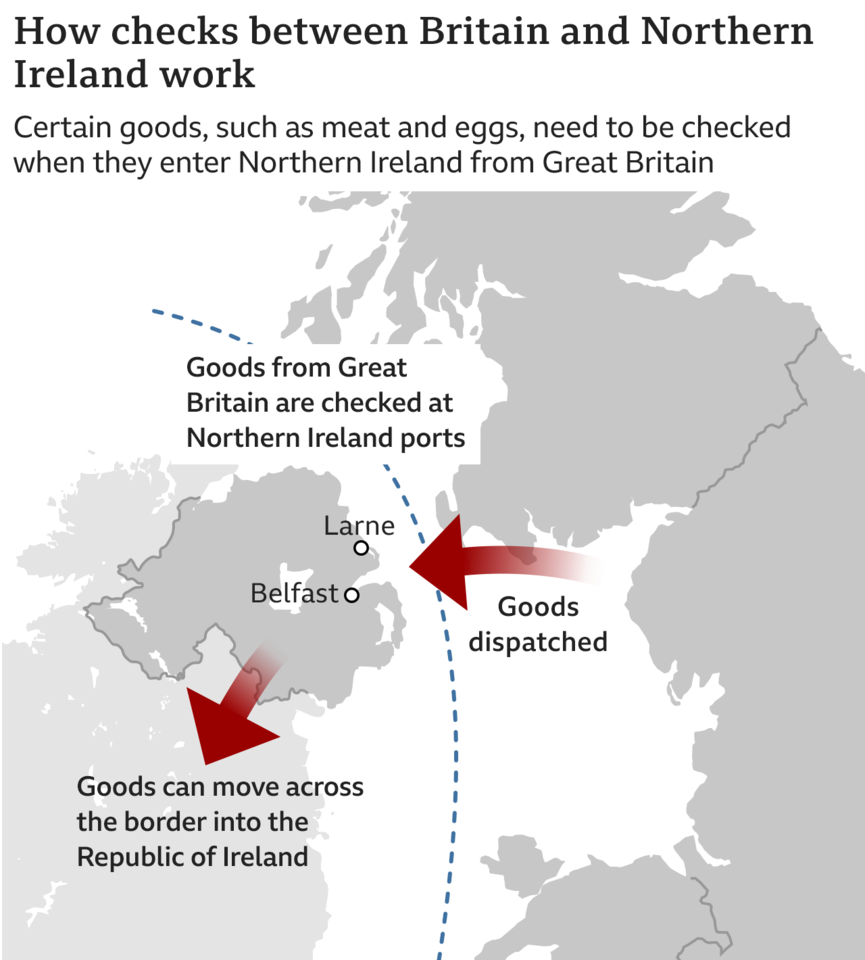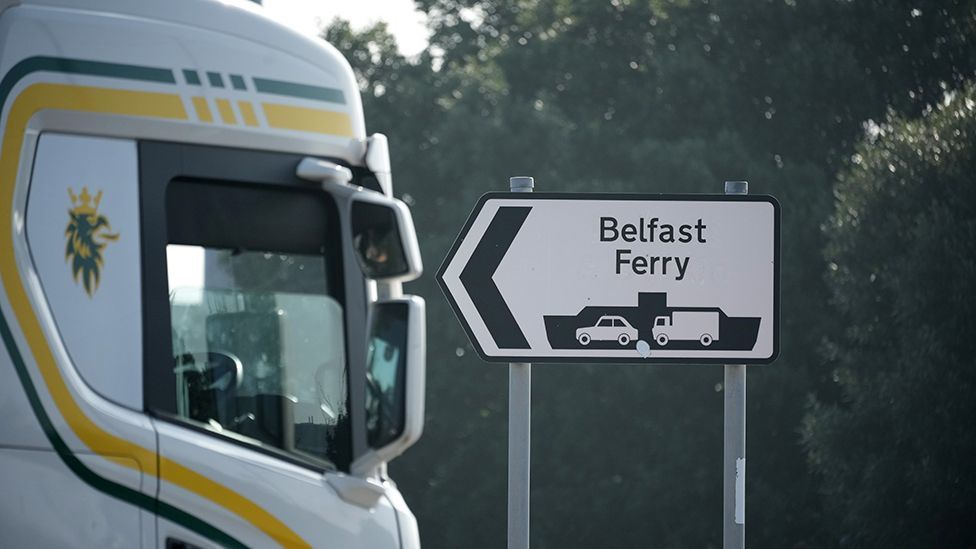
NI Protocol: UK override bill 'won't break international law'
Brandon Lewis said he was confident the changes would be lawful.
The UK government is due to publish legislation on Monday that would allow ministers to override parts of the Northern Ireland Protocol.
The protocol keeps Northern Ireland inside the EU's single market for goods.
It prevents a hard border with the Republic of Ireland but means checks on some goods arriving from other parts of the UK.
Critics of the move, including the Irish government, have said any unilateral action could breach international law.
However Mr Lewis said that when people see the legislation "they'll see it's focused on fixing the problems with the implementation of the protocol".
"Doing so is not only within international law but works for people across the United Kingdom and respects the EU single market," he told BBC News NI's Sunday Politics programme.
Earlier, Mr Lewis told the Sunday Morning programme the UK government would also set out its legal position when introducing the legislation.
He said the legal position would "make sure people see it is within international law".
On Saturday, BBC News NI economic editor John Campbell wrote that representatives from the food industry in Northern Ireland warned that scrapping the protocol could damage businesses.
The Northern Ireland Food and Drink Association (NIFDA) told BBC News NI the protocol was working for the majority of its members.
But Mr Lewis said businesses did not want to see "uncertainty and instability" and some industries, including hospitality, had been "consistently clear that parts of the protocol are causing issues".
He added: "When people see what we're proposing tomorrow, it is sensible solutions to the very issues that have been detrimental to businesses."
What is the Northern Ireland Protocol?
The trade deal governs how goods enter Northern Ireland from the rest of the UK and was agreed by the UK government and the European Union following the Brexit vote in 2019.
It was designed to prevent a hard border on the island of Ireland when the UK left the European Union.
The protocol led to the creation of new goods checks at Northern Ireland sea ports on some products from Great Britain, effectively creating a new trade border in the Irish Sea.

Unionist parties, including the Democratic Unionist Party (DUP), argue that this has led to extra costs and unnecessary delays, as well as undermining the union between Northern Ireland and the rest of the UK.
What could be in the new legislation?
On Sunday, Irish newspaper the Business Post reported that officials from the UK's Department for Environment Food and Rural Affairs (Defra) have written to agri-food businesses setting out what the changes will mean.
The letter reportedly said ministers would remove all customs processes for goods moving within the United Kingdom and enable the frictionless movement of agri-food goods staying within the UK.
It also indicated that businesses in Northern Ireland could have the ability to choose whether to follow UK or EU regulations, depending on who they are trading with.
When asked on the Sunday Politics programme about the possibility of moving to a dual-regulatory system, Mr Lewis said the UK government wants a system "where products that are moving from Great Britain to Northern Ireland to be consumed or used within the UK can do so freely and flexibly".
 The new law may allow for firms to choose whether goods follow UK or EU regulations, depending on who they are trading with
The new law may allow for firms to choose whether goods follow UK or EU regulations, depending on who they are trading with
"That means giving businesses in Northern Ireland options and the ability to trade both ways as part of the United Kingdom, but have that free ability to trade with the (EU) single market.
"We think we've got a proposal that's very sensible and does that and can give confidence to the EU that there is no risk to the single market."
Any legislation would have to be approved by Parliament, a process which could take months. The legislation could also face challenges by both rebel MPs from within the Conservative Party - after the recent revolt against Prime Minister Boris Johnson's leadership - and in the House of Lords.
The EU has previously acknowledged issues with the protocols and, last October, put forward its own proposals which it said would cut paperwork and checks on goods entering Northern Ireland from Great Britain.
However, the UK rejected these plans saying they would make things worse.
Will it solve the Stormont crisis?
A row over the impact of the protocol has created a block on forming a devolved government in Northern Ireland, with the DUP stopping the assembly from sitting or a new executive being formed since Sinn Féin emerged as the largest party in May's election.
The DUP, which has the second highest number of Stormont seats, has refused to support the election of a new speaker or first and deputy first minister until there is "action" on the protocol.
Asked whether Monday's legislation could tempt the party to return to power-sharing, Mr Lewis said he hoped the DUP would see it "resolves the issues they've been concerned about".
"If the DUP are true to what they have said and the reason they withdrew around wanting to see positive progress on fixing the problems of the protocol, this legislation will do that," he added.
But DUP MP Sammy Wilson said it was too early to make a final judgement on the legislation.
"It was supposed to be published on Thursday, it wasn't because there were still arguments within the cabinet and the Conservative Party on what should be contained in the legislation," he said.
"We have seen and have been told bits and pieces of what is there but since it has been a changing feast all week, until we see the final draft, then it's impossible for me to judge on."
During the past week, DUP leader Sir Jeffrey Donaldson defended his party's saying that "there is not cross-community support for the protocol".
Sinn Féin has said any move by the UK government to change the protocol would be "unacceptable to the wider public and majority of MLAs (Northern Ireland Assembly members) who support the protocol".
Speaking to Sky News on Sunday, Sinn Féin leader Mary-Lou McDonald said that the UK legislation would break international law and cause "huge, huge damage" to the Northern Irish and Irish economies.
On Wednesday, the Taoiseach (Irish prime minister) said unilateral action on the protocol would mark a "historic low".
Speaking at the European Parliament, Michéal Martin said it was "perfectly reasonable" to want to make improvements to the protocol but warned that any attempt to do so outside the agreed joint mechanisms would damage the rule of law.










